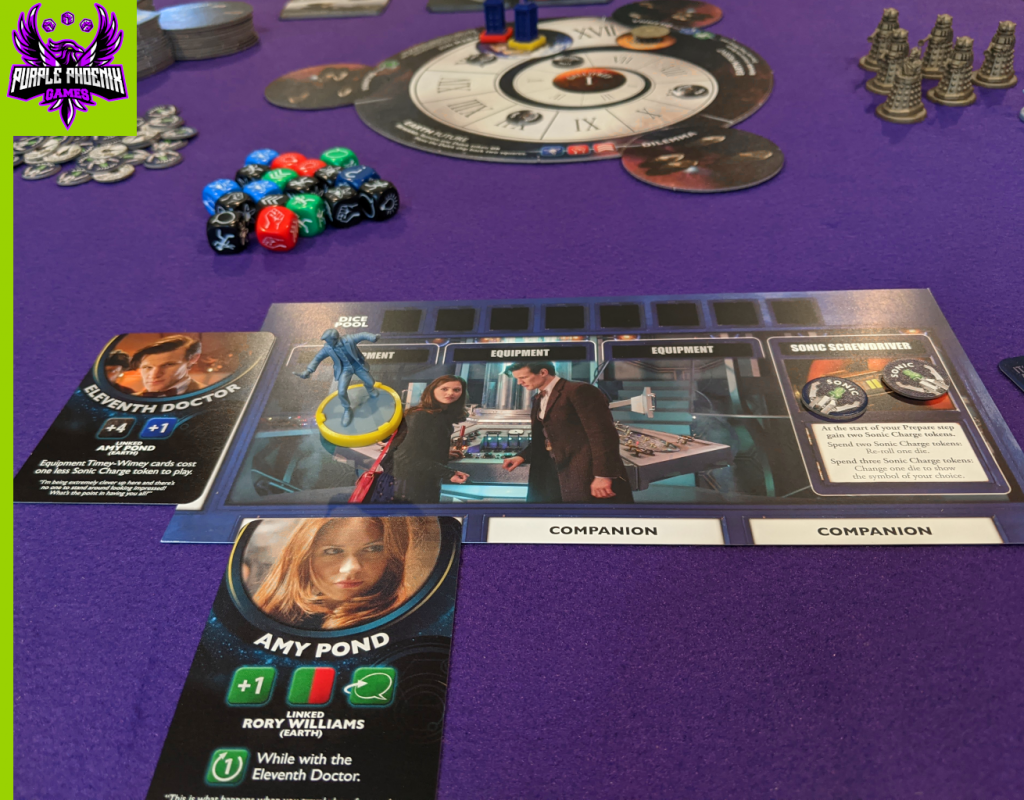
I cannot tell you what a big fan of Doctor Who I am. I have one sticker on my car, and it’s a DW TARDIS right there in the upper left. They say you’ll never forget your first Doctor, and I only started watching several years into the reboot, but started with 9. And then 10 stole my heart. 11 was also quite amazing and I always reference people who have never seen the show to please please please watch, “Vincent and the Doctor.” If you watch that episode and are not moved to tears by the sheer beauty of the story being told, you absolutely have no soul. And if after watching that episode you are not an immediately-converted Whovian, then it was never meant to be. So why then is my rating on this game so lackluster if I love the IP so?
| Doctor Who: Time of the Daleks (2017) | Gale Force Nine |
| 2-4 Players | 120 minutes |
| Ages 14+ | BGG Weight – 2.33 / 5 |
Doctor Who: Time of the Daleks (which I will carefully refer to as DW from here on out though I would never abbreviate to Dr.) is an adventure dice racing game, even though the only official tag is dice. In it, players take on the roles of different Doctor regenerations and will travel through time and space collecting companions, Timey-Wimey cards, and Sonic Charges in order to manipulate dice rolls to defeat Dilemmas and Time Anomalies that pop up at the absolute worst times.

To setup, follow the rulebook instructions – there are just too many components to detail here. The game takes up quite a bit of table space, so do make sure to use your largest table.
On a player’s turn they will be adding Sonic Charges, shuffling up companions, and rolling the TARDIS die to determine travel. Once at a location, the Doctor (and subsequent harem) can Adventure by assessing the challenge of dice results printed on the Location board plus the Dilemma disc combined. It is these icons that must be rolled (and possibly manipulated) in order to have a successful adventure. If successful, typically this involves a reward of moving the TARDIS pawn on the main Web of Time board closer to Gallifrey, in addition to other rewards. Failure on an adventure will typically result in the Dalek ship being moved further from Skaro and closer to Gallifrey.
Once the Doctors have had their turn, the Daleks will take a turn. Immediately move the Dalek ship one space on the Web of Time track towards Gallifrey, and if they have reached Gallifrey before any Doctor, or on the same turn as a Doctor, the Daleks win and the Doctors all lose. If not, play continues in this fashion until one of those win conditions are met, along with a couple more loss conditions I will leave you to discover.
This is a very pared-down synopsis of the rules, and I have intentionally left out several rules so as not to bog down my paraphrasing with minutia. Take this into consideration when determining if this is the game for you.

Components. All in all the components in DW are absolutely stellar! All the cardboard is thick and features great art and screencaps (which is a polarizing subject that I simply don’t mind). The dice are great quality, though I wish they had chosen a different color for the blue dice so that the TARDIS die would be the only blue in the box. The minis are great, and have interchangeable bases because throughout the game the Doctors may have to regenerate, thus switching to a different Doctor mid-game (awesome mechanic for this IP by the way).
Let me tell you why I like this DW game and why I do not. Firstly, the game is just too hard for me. Maybe it’s how I roll the dice, but I feel I am almost never in possession of enough resources to be able to reroll or manually manipulate my dice results enough to have the requisite amount of successful adventures. Some challenges require the Doctor to roll six dice, but then there are restrictions in play that drop a Doctor’s dice pool down to six, thus creating a you-must-roll-EXACTLY-what-you-need-to-win scenario that is tough to swallow for a dice game. Also, this next part is completely personal opinion, I wish that 10 was included in the starter box. I got my 11, and I appreciate that, but I feel like 10 is the most widely-popular Doctor in the franchise, or at least in New Who, so the ball was dropped here. I know I can purchase 10 in an expansion pack with 5 (and kudos to whomever made THAT combination), but I want him NOW.
Time travel games are so difficult to pull off, and with Doctor Who you HAVE to consider that time travel will play a very important part in gameplay. I believe this title handles it well, and even allows for multiple Doctors to work together (let’s not talk about time paradoxes for now). That is great and allows for excellent cooperative play, so I applaud the designer for that. I also enjoy the different abilities given by each different regeneration as well as what the companions each bring to the table. Perhaps a companion will add certain colors of dice to the Dice Pool, or allow the Doctor to switch out some of his generic dice for stronger and more specific dice, or simply allow rerolls of certain colors of dice. I dig that a lot. And seeing my precious companions in the game matched up to their Doctors fills me with a sense of nostalgia that I just do not feel in other games.
While this has been the subject of much deliberation on my part, I will be keeping my copy of the game, and will most definitely be adding 5 and 10 to the mix. I really want to like this game more than I do, and maybe having 10 in my arsenal is enough to do it, though I have my doubts. I love the Doctor Who IP and love dice games. I think this is a good game overall, and will continue to explore it with other gamers. Something will click, I’m sure of it. Purple Phoenix Games gives this one wibbly-wobbly 8 / 12. If you need a difficult dice game in your collection and also love the Doctors, pick up a copy. But also do yourself a favor and grab a copy of any expansion that includes your favorite Doctor – you will thank me later. Spoilers, sweetie, that’s coming in tomorrow’s post.

